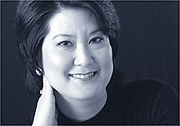


Changing Hawaii
LIKE other news junkies, I read lots of newspapers, newsletters and news magazines, and can't wait for the end-of-the-day TV news wrap-ups. I'd like to watch all four local and national newscasts from start to finish, but it's tricky when they're on the air simultaneously. Premature indictments
by the mediaDifficult, but not impossible. Thus, at 6 and 10 p.m., I grasp my coveted black remote control and begin darting between ABC, NBC, CBS and FOX like some kind of mad zapper.
As long as the talking head on the screen holds my attention, I'm a devoted fan. But as soon as the story gets boring or silly, or during the commercials, watch out. It's channel-surfing time!
By monitoring the medium this way, you can see how each of the four networks handles a big story -- like the horrendous Oct. 31 crash of EgyptAir Flight 990. The Boeing 767, carrying 217 people and destined for Cairo from New York City, crashed soon after takeoff. All aboard perished.
This event is of tremendous public interest, not only because of the magnitude of the tragedy and the commonality of air travel, but the mysteriousness of the cause. Human nature simply wants to know how this could have happened.
What was to blame? Who is the culprit? These questions are still being debated on newscasts almost nightly, nearly a month later.
Unfortunately, some of the hypothetical answers have led to what may be premature and irrevocable indictments of people and their families.
In EgyptAir's case, and ever since federal authorities have indicated the crash did not result from mechanical failure or a weather-related incident, fingers have been pointing at one of the co-pilots.
The networks have been naming him and showing his photograph, hypothesizing that he may have purposely downed the plane in a suicide-type mission after shutting off the autopilot and fighting over the controls with the pilot.
It was also widely reported that he had uttered a prayer before turning off the cockpit voice recorder, one loosely translated as, "I made my decision now. I put my faith in God's hands."
His family, of course, is devastated by such allegations. Weeping relatives have been interviewed by the same networks trashing his name, desperately trying to defend him and his integrity.
How horrible to have a loved one, now deceased, being accused of committing the heinous, unforgivable act of murdering over 200 people.
THEN, on the front page of Saturday's Star-Bulletin, came the Reuters news service story that said the EgyptAir cockpit voice-recorder tape had been translated wrong.
According to writer Tim Dobbyn, some of the words attributed to the co-pilot -- particularly the prayer that bolstered the theory that the plane was deliberately crashed -- were in fact never spoken. "The admission strengthens Egyptian opinion that U.S. media and officials are rushing to judgment," Dobbyn wrote.
I felt awful -- for the maligned co-pilot, for my profession and especially for my own fickleness. Because now I realize that my penchant for channel-surfing, that constant quest to be informed and entertained and wanting to know more, more, more from the networks, is the reason they are fiercely competitive in the first place.
So competitive, in fact, that they will even resort to flinging accusations before an investigation is completed and all the facts are in. Who said the dead can't be defamed?
Diane Yukihiro Chang's column runs Monday and Friday.
She can be reached by phone at 525-8607, via e-mail at
dchang@starbulletin.com, or by fax at 523-7863.